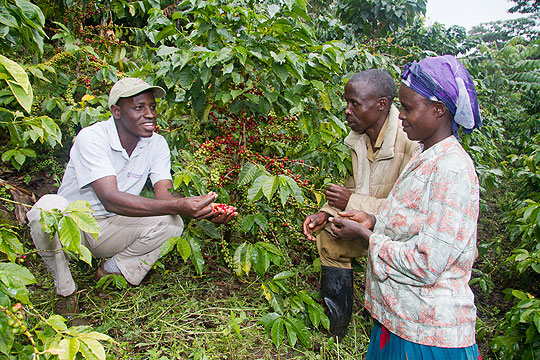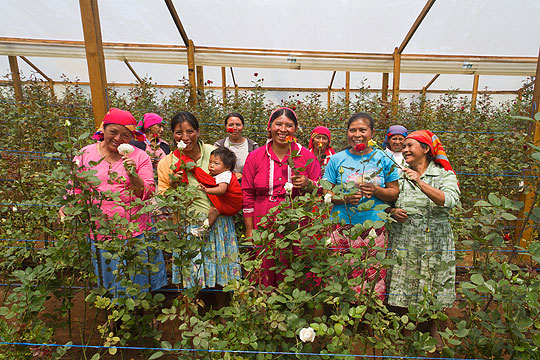From Our Partners: TechnoServe – the Year Ahead
Editor’s Note: This is one in a series of articles featuring NextBillion’s 2012 Content Partners in which leaders offer their views on important trends impacting their work and new initiatives to alleviate poverty through market-based solutions. Today we hear from Simon Winter, TechnoServe’s senior vice president for development, who answers questions about TechnoServe’s direction in 2012.
Q: The core of TechnoServe’s work is in value chains – helping smallholder farmers to improve their production, form sustainable businesses and connect to higher-paying markets. How do you see this work evolving in the coming year and beyond?
A: We are deepening our focus on improving food security for poor households, with a strong emphasis on making markets work for staple crops such as maize and rice. This is a relatively new area for us, as TechnoServe’s particular expertise has been in cash crops such as coffee and cocoa. But we think the lessons we have learned through decades of strengthening value chains will have direct relevance for staple crops.
As we help farmers improve their staple crop productivity, we also want to pay attention to another key aspect of food security: nutrition. We are working to integrate nutritional components into our value chain programs. For example, we are working with Partners in Food Solutions – an organization founded by General Mills along with Cargill and DSM – to strengthen the capacity of African food processors to make nutritious products. We also recognize that it’s important for families to eat a balanced diet, and we’re exploring ways to ensure that farmers are incentivized to improve production and marketing of fruits and vegetables along with staple crops to ensure a healthy balance in their diets. Farmer organizations can play a key role in disseminating educational messages around nutrition.
TechnoServe is nearing the end of the first generation of several large-scale programs in industries such as coffee, dairy, cashew and cocoa. As we explore ways to expand and enhance this work, we’re focusing on filling gaps that may not have been adequately addressed. For example, we learned that food safety considerations are becoming a key driver of competitiveness in the cashew sector, so we are planning to strengthen that aspect of the industry in West Africa.
As traditional sources of funding are tightening up, TechnoServe is shifting our partner and support base toward newer sources, including private sector companies such as Coca-Cola and others. Global companies are increasingly recognizing the long-term benefits to themselves as well as the communities in which they operate of playing a more meaningful role in international development, but they understand that they can’t do it all themselves. The smart ones are working to build alliances with local governments and experienced implementing partners like TechnoServe.

Q: The world’s population recently hit 7 billion and is projected to reach 9.3 billion by 2050. It’s clear that agricultural innovations are needed to feed a growing population sustainably and improve food security in developing countries. How is TechnoServe addressing this challenge?
A: Any discussion of feeding a growing population must begin with increasing yields on existing farmland. The greatest opportunity to do that is in the developing world, where many farmers use traditional methods and thus have great potential to improve their productivity. This is at the core of TechnoServe’s philosophy – by helping farmers in developing countries improve their agronomic practices and the value from their interactions with attractive markets, we can increase household incomes and help feed a growing planet. And since most people buy at least some of the food they consume, higher household incomes mean greater food security.
It’s important to note that productivity gains don’t have to come at the expense of environmental sustainability. The two can complement one another. For example, in our coffee work in East Africa, we’ve helped to introduce improved wet-milling equipment that significantly reduces water use. This not only helps farmers improve the quality of their coffee, it also produces strong environmental benefits. In general, our work with post-harvest processes is a key element in improving food security. TechnoServe is exploring a number of different models that will help farmers store their own staples, allowing them to sell when prices are advantageous and keep some food for their own families. Good post-harvest practices can also help reduce losses, which can make a huge difference in improving the quantity of food available. In sub-Saharan Africa alone, post-harvest losses for grains are estimated at nearly $4 billion a year out of $27 billion worth of grain production.
A critical part of increasing food production is to make agriculture a commercially attractive profession, especially for the younger generation that is leaving rural areas for cities in huge numbers. If we can keep young people on the land producing food, we will see the twin benefits of improved availability of food and less strain on city infrastructure. We can do this by connecting smallholder farmers to better markets and increasing the economic incentive to farm. And it goes beyond just farming – it’s vital that we recognize the importance of agribusiness and promote sustainable small and growing businesses within agricultural industries and off-farm as well.

Q: This year’s World Development Report from the World Bank found that the lives of women across the world have improved dramatically in recent years, but gaps remain in many areas – especially in the developing world. Is TechnoServe placing a particular emphasis on improving the lives of women through its programs?
A: This is a key area of focus for TechnoServe. We are working to make gender a primary consideration in all of our programs. And this is not just about women – it’s about the relationship between women and men, and women and society. As we train the women, we need to be providing similar training for men in the same forum. As a result, men recognize that they create opportunities for themselves by helping their wives and daughters improve their lives.
We’re doing our best to engage women in an assuring and comfortable way. This means being sensitive to their needs and considering factors such as time of day, location and child care. We’re paying attention to the role women play in household nutrition. And we are working to involve women in our programs as active participants – as industry leaders, entrepreneurs and employees.
One particularly bright spot we’ve seen is the emphasis that companies such as Walmart are placing on promoting women entrepreneurs and involving them in the companies’ supply chains. When working with such companies, we’re able to leverage our experience and learnings from programs that target women entrepreneurs in places like Kenya and Uganda. We will be exploring how other companies can follow this example and use their influence to better the lives of women.
Q: Small and medium enterprises (SMEs) are vital to economic growth, but the SME sector in developing countries is often constrained by a number of factors. What has TechnoServe learned about the constraints that SMEs face in the developing world, and how are your programs working to address those challenges?
A: Small businesses in the developing world lack a number of advantages that their counterparts in the rich world have. First, I would cite a lack of information about the most competitive business opportunities and the drivers for improving competitiveness. TechnoServe tries to address this issue by prioritizing value chains that offer the most competitive opportunities and have the potential to generate growth that can lift people out of poverty. We develop strategic plans for these industries and share this knowledge broadly with entrepreneurial people who can build successful businesses. And we’re looking at ways to make it easier to set up a business at lower risk – for example, we’re exploring the potential of the franchise model in certain industries.
A second major disadvantage in the developing world is the lack of role models, especially for young people. There is, at best, a weak culture of entrepreneurship in many of the communities where we work, so entrepreneurial people find it difficult to reach their potential. Through our business plan competitions and other development programs aimed at enterprising people, TechnoServe connects young would-be entrepreneurs with people who have extensive business and entrepreneurial experience. This helps fill a vacuum of mentoring and support opportunities for young people.
Finally, developing countries need more sources of early-stage growth capital for entrepreneurs who don’t want to give up ownership of their businesses. There is a high level of wariness around equity investments from professional investors, as people worry that such investors will take control of their company. The supply of this type of capital has improved in recent years, but there is still work to be done to ensure that this capital is deployed to businesses with the best potential. TechnoServe has developed an “accelerator” model that we’re using in places like Haiti in order to bring together promising entrepreneurs, patient investors and others who can help entrepreneurs build their businesses.
Q: What areas of innovation will TechnoServe target in 2012? What broader signs of encouragement do you see in the development sector?
A: One big area of innovation that we’re targeting is mobile technology. Mobile phones are becoming as ubiquitous in the developing world as they are in developed countries. Even in poor rural areas, many people now have access to a mobile phone. TechnoServe, together with a range of experienced partners, is now working aggressively to leverage mobile technology and services in ways that benefit smallholder farmers. Mobile technology can provide a number of benefits: reducing transaction costs for both small-scale farmers and large businesses, improving transparency and accountability, reducing the cost of our program delivery and improving our monitoring and evaluation. Mobile services such as weather information, insurance and mobile banking, money and payments can help reduce systemic risk for farmers. We have incorporated mobile technologies into several of our programs, and we’re currently pursuing partnerships with several major mobile network operators.
Another area of focus for TechnoServe – and a particularly bright spot on the development landscape – is the increasing recognition that corporations can create positive social impact while also strengthening their businesses. This concept was well-defined as “creating shared value” by Michael Porter and Mark Kramer. From our standpoint, we’ve seen that certain companies are taking a strategic approach to development projects and deepening their engagement. There’s no shortcut for companies to find the win-win scenario. But more senior business leaders are learning that they can do well and do good at the same time.
- Categories
- Agriculture, Education
